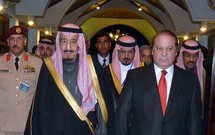 Last Wednesday, Pakistani Prime Minister Nawaz Sharif arrived in Saudi Arabia. Saudi King Salman met him at the airport. The Saudi king typically meets only the most distinguished visitors at the airport, so this was an early sign that this visit was somewhat more significant than most. It was enough to cause us to wonder about the significance.
Last Wednesday, Pakistani Prime Minister Nawaz Sharif arrived in Saudi Arabia. Saudi King Salman met him at the airport. The Saudi king typically meets only the most distinguished visitors at the airport, so this was an early sign that this visit was somewhat more significant than most. It was enough to cause us to wonder about the significance.
A short time later, a spate of news stories beginning with Pakistan's Express Tribune, which claimed to have heard this from contacts in the Pakistani government, reported that the Saudis were requesting an infusion of Pakistani troops to protect the kingdom. The request is not quite as remarkable as it might appear. Pakistani troops were deployed in Saudi Arabia in 1979 during the rise of Ayatollah Khomeini's Islamic republic. Troops were also stationed there during Desert Storm, and smaller numbers have been present in the kingdom from time to time. However, the recent rumors about the Saudi request have become both more detailed and less believable, with claims that the Saudis had requested both Egyptian and Turkish troops to guard the border.
There has been no official comment from Saudi Arabia and some upper-midlevel denial from Pakistan. According to a separate source in the initial report, the Saudis offered Pakistan shipments of oil on deferred and discounted payment terms. What is certain is that last week's meetings came after a long string of high-level meetings, including meetings with Sharif, whom the Saudis protected when Pervez Musharraf's regime regarded him as an enemy. So we know that the Saudis have asked for and gotten Pakistani troops before, and we know that Sharif, of all Pakistani prime ministers, would be the most inclined to support the Saudi government. And we know that in spite of the wide repetition and enhancement of the initial report, neither the Saudi nor the Pakistani government has issued a definitive denial.
We also know that the Saudis have good reason to be worried about their security. The Islamic State is entrenched in both Iraq and Syria, and the Saudis are concerned about supporters of the group within the kingdom. The Islamic State is highly unpredictable, and the Saudis could feel that their own military may not be sufficient to manage the threat. In addition, a civil war is raging in Yemen, along Saudi Arabia's southern border. Not only could that spill over into Saudi Arabia, but also the Saudis are trying to manage the crisis, supporting a two-state solution there. They might want Pakistani troops to add weight to their diplomacy. Both of these are sufficient reasons to ask for help.
But the greatest reason is the growing relationship between the United States and Iran. Leaving aside the nuclear negotiations, which are inching forward and certainly not collapsing, the United States and Iran have similar interests in Iraq: Both want to break the Islamic State. The Saudis also want this as well, but they are appalled that what might replace the group is some sort of joint U.S.-Iranian management of Iraq.
As we have said before, the United States wants to limit its direct involvement in regional conflicts and replace it with support for regional powers that have no choice but to become involved. These are wildly different nations, including Turkey, Iran, Saudi Arabia and Israel. The Saudis have bad memories of Ottoman oppression and a fear of Shiite Iran. They have a complex and multilayered relationship with Israel. The United States used to be the guarantor of Saudi national security. In its new role, Saudi Arabia is only one of a constellation of countries in which the United States is involved.
Of all these countries, the one that concerns Saudi Arabia the most is Iran. It is the closest. It has a history of covert interference in Saudi Arabia, and given the convergence of Iranian and U.S. interests, it might well wind up in a favored position in the region. It is a risk that the Saudis cannot accept. Turning to Pakistan gives the Saudis more military and security weight. And it does not hurt that Pakistan is a nuclear power; although the use of nuclear weapons by Pakistan is extraordinarily unlikely, the possibility could still give Iran and other countries in the region pause.
Saudi Arabia, the weakest among the other major regional powers, needs more weight and needs to give the others pause, and the Saudis wouldn't mind the United States wondering at what they are doing. Asking the Pakistanis to resume a role they played in the past — guarantors of the Saudi regime internally, and of Saudi Arabia's borders externally — makes a great deal of sense, and given Sharif's relationship with the Saudis, it is logical. Whether this strategy extends to requests to Egypt and Turkey is dubious for several reasons, not the least of which is that neither is likely to agree to it.
We have long spoken about the shift in how this region works. Even if nothing comes of it immediately, we are seeing moves by the Saudis to try to cope with the new reality. As the patterns change, the region will respond. This is not really a radical move. Other developments could be more surprising, like the Iranians and Americans collaborating against the Islamic State.
Courtesy : Stratfor (www.stratfor.com)